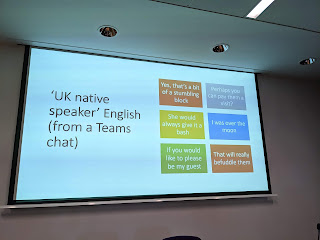IATEFL 2022 report and reflection
Some highlights from the annual IATEFL conference, which took place in Belfast on 17-20 May
The first post-pandemic 'in-person' IATEFL conference saw a slight dip in attendance figures – about 1600 delegates compared to the pre-pandemic figures of nearly 2500 attendees – but it didn't detract from the electric atmosphere, which was largely due to the ability to interact face-to-face again. Indeed, I didn't see members of my PLN for three long years! Between networking and catching up with friends and colleagues I managed to see some sessions. Here are some highlights.In her first IATEFL presentation, the proud IATEFL scholarship winner Rachel Tsateri shared a framework for planning collaborative and reflective online lessons she had devised during the period of emergency remote teaching. She referred to the framework – or at least the main portion of it – as a jigsaw-gloss. As the name suggests, the framework combines two collaborative learning techniques: jigsaw-reading or, in this case, listening and dictogloss (read more HERE).If Rachel's framework concerned lesson planning, Maria Davou, an edupreneur and school owner from Athens, shared a framework for language education in general called Deeper Learning. The innovative framework, which is used by Glossomatheia, a language school Maria runs in Athens, places emphasis on philosophical enquiry. At the beginning of a school year, students choose content areas they are interested in and, with the help and guidance of teachers, delve deeper into the chosen subject area throughout the year.
 |
| A slide from Maria Davou's presentation (apologies for the poor quality) |
Encouraging the audience to rethink the role of published materials and focus on what matters – the learner and learning – Maria admitted that the first two months without any coursebook can be intimidating. She also traced how the approaches to language learning has evolved from learning through automation/drilling to learning through doing and learning through thinking.
 |
| Voting for the best sentence at Ken Lackman's workshop. Our group's sentence (involving the word "atrocities") won. |
Being one of my so-called lexical buddies, Ken is naturally very much on the same page regarding what is considered a collocation in pedagogical terms - a combination of two content words. According to Ken and myself, switch off would not qualify as a collocation (although some linguists may consider it as such), but switch off the light (verb + noun) would.
It was my eighth time attending IATEFL in-person – and seventh time presenting – and I've never missed a single session Ken Lackman has given, save, perhaps, for one or two. I've come always come away with a new technique or a fresh idea.
Despite this being my seventh time presenting I can't say I didn't suffer from nerves before my presentation on Day 2 and hardly attended any sessions that day. Was it because it was my first international conference appearance in more than two years or the fact that for the first time my presentation was designated as "prodprom" (product promotion) as I was demonstrating activities from my new book?
I resumed my attendance on Day 3. That was the day of the the BESIG showcase. Just to clarify, a showcase is a series of presentations lasting all day organised by one of IATEFL's Special Interest Groups. Opening the showcase was Ian Badger, an author of a number of popular Business English titles, with a talk on the rules of everyday business writing.
 |
| Some native speaker idioms that may lead to breakdowns in communication |


